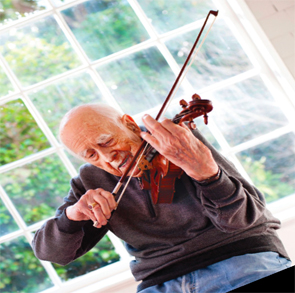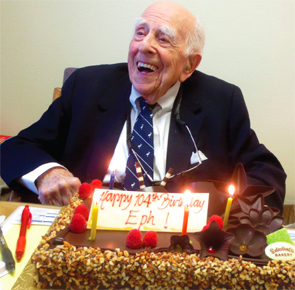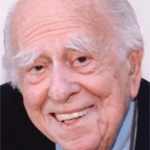
Dr. Engleman played the violin from the age of 2 throughout his life.
Two years ago, at the age of 102, rheumatologist Ephraim P. Engleman, MD, FACR, FACP, published a memoir, My Century, in which he detailed his personal and professional accomplishments, as well as his secrets to longevity. With his characteristic sense of humor, Dr. Engleman noted that the first secret to a long life is to “make sure you get parents with good genes.” No. 3 on that list was to enjoy one’s work, a precept that Dr. Engleman embodied till the end of his life. “Eph,” as he was affectionately known by his colleagues, died Sept. 2, while working in his office at the Division of Rheumatology at the University of California, San Francisco (UCSF).
“Eph [pronounced ‘Ef’] was a remarkable man, not only for the length of his life, but also [for] the way he lived his life,” says Lindsey A. Criswell, MD, MPH, DSc, Jean S. Engleman Distinguished Professor and chief of the Division of Rheumatology, UCSF. She notes that the way in which he integrated his three major passions—his commitment to advancing the field of rheumatology, his dedication to his family and his lifelong love of music—made him “a role model for all those who had the privilege of working with him. For those of us who have been part of the UCSF rheumatology program, there is no one who has had a greater impact on our work than Eph Engleman,” she says. “We will be forever grateful for his generous and enduring support of our program.”

Dr. Engleman celebrates his 104th birthday at UCSF in March 2015. (photo courtesy of David Wofsy, MD)
In his nearly 70-year academic medical career, Dr. Engleman made prodigious contributions to the growth of the UCSF research and training program and to the national research agenda for arthritis. A past president of the ACR (then known as the American Rheumatism Association), Dr. Engleman received numerous awards for his distinguished career in rheumatology, including the ACR’s Presidential Gold Medal, the prestigious Gold Medal from the Columbia University College of Physicians and Surgeons, and UCSF’s Medal of Honor. He was also granted honorary membership in the Chinese Medical Association and the rheumatology societies of Australia, France, Japan, Spain and Uruguay.
Career Beginnings
Born in 1911 in San Jose, Calif., Dr. Engleman began playing the violin at age 2, and continued playing throughout his life. In fact, his first job, at 16, was playing violin in an orchestra that accompanied silent films at the Fox California Theater. As a result, he said, it took him six years to complete his undergraduate degree at Stanford University. He did his medical training at Columbia University and was one of the first physicians in the country to train in the new subspecialty of rheumatology.
